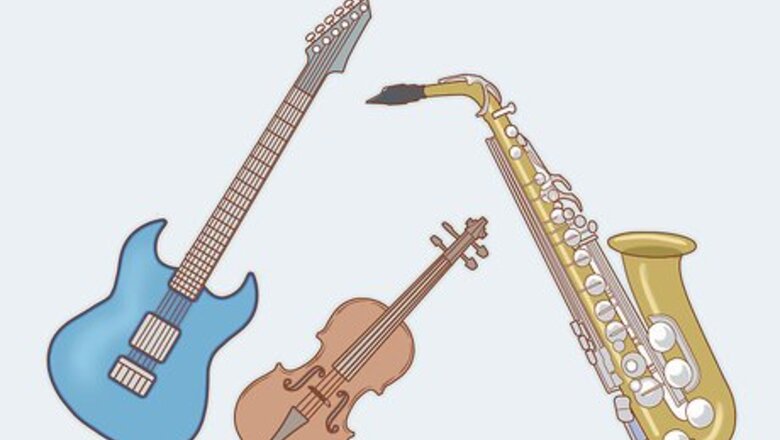
views
Choosing an Instrument
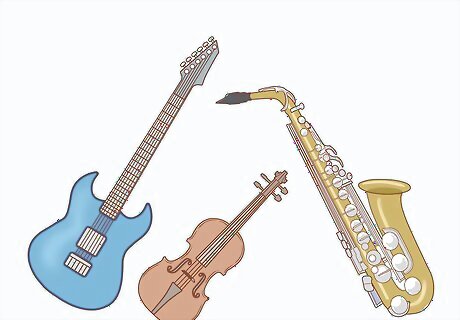
Choose an instrument that suits your interests. If your goal is to become an on-stage rocker in a scruffy punk band, it's true that you could learn a lot about music playing the oboe, but it probably isn't the best way to form the band you want to form. If you want to play classical music and become a virtuoso, there's little room for synthesizer, unfortunately. Pick a category of instrument that fits your ambitions for being a musician. If you just want to learn to play something, start on piano, violin, or guitar even drums can also help. These instruments generally have the most teachers in a given area, making it easy to find lessons and learn the basics of the instrument. If you'd like to eventually play classical, art music, or jazz, it's important to pick up an instrument in the classical string category, a woodwind, brass, or percussion instrument. These players generally dedicate lots of time and scholarship to learning their instrument. If you want to write your own songs and play pop music, it's usually best to pick up a guitar, bass guitar, piano, or learn to play the drum kit. While it's great to take lessons, lots of pop and folk musicians are self-taught, using DIY books, YouTube videos, and good old-fashioned trial and error.
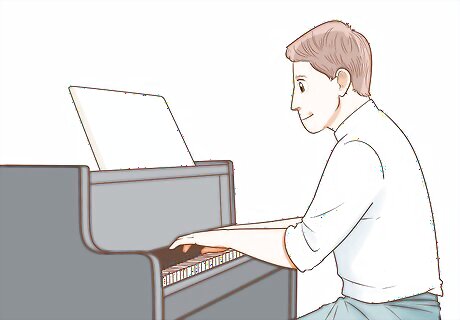
Consider starting on piano. Even if you don't envision yourself being a concert pianist doing recitals in a tux, one of the best ways to build a good foundation as a musician is to learn piano. Because all the notes are laid out in front of you, piano makes an excellent first instrument, popular with young children and beginners. It's also one of the most versatile instruments, played in classical, pop, and many other styles of music. Real upright or concert pianos can be expensive, but electric keyboards come at a variety of prices, from affordable to very professional and expensive. The great thing about piano is that you can learn the necessary fingerings and fundamentals regardless of the quality of the piano you're playing.
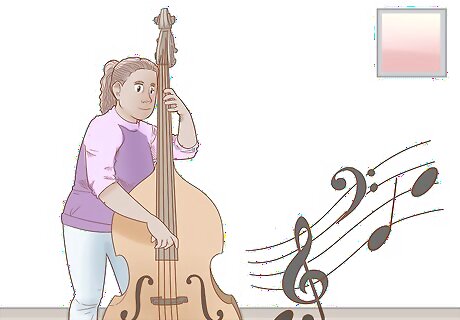
Learn about the classical instruments. Used in concert music, jazz, pop bands, swing bands, and other types of sheet-music played by instrumentalists, classical instruments refer to the many different varieties of instruments played in organized professional bands that play something other than pop music. If you love complicated, artistic, and sophisticated music and history, learning one of these instruments would be appropriate for you. While they're not actually made of brass anymore, brass instruments are made of winding metal tubes that you blow through to create a tone. Woodwinds are made of composite materials and are played by vibrating a reed that's held in a mouthpiece. Producing a distinctive warm and woody sound, woodwinds are used in classical music and jazz, and saxophones are used often in pop music. Pick up a classical string. Used in orchestras, string quartets, and other types of professional ensembles, violins, violas, double-basses, and cellos form the foundation of the classical strings. Guitars could also be considered a classical string, depending on the style of music.
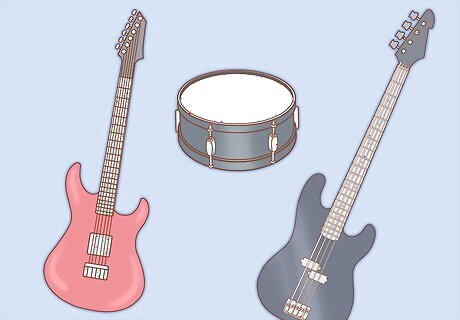
Consider pop or rock instruments. While all these instruments can be used to play a variety of styles and sounds, when we think of playing pop music or starting a band of our own, we usually think of guitar, bass guitar, drums, and keyboards or piano. If you're less interested in being the kind of musician who plays in a tuxedo at a concert hall and more interested in being in a garage band that tours around in a van, these might be the right instruments for you. Guitar Bass guitar Drums
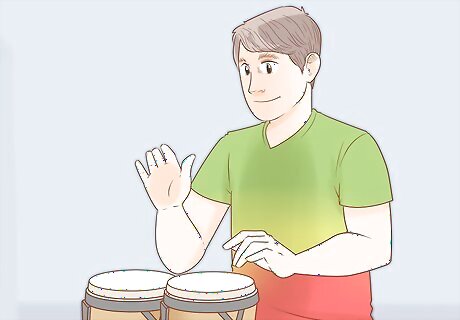
Consider playing percussion. Percussion is so much more than background. Good percussionists drive the music forward in every variety of music, from folk to classical, from jazz to rock and roll. There's nothing more versatile and essential to a group of musicians than a talented percussionist keeping time. One of the best things about percussion is that you can start building the skills without any kind of instrument at all. If you have an internal sense of time and the ability to keep a steady beat with your hands, consider learning percussion.
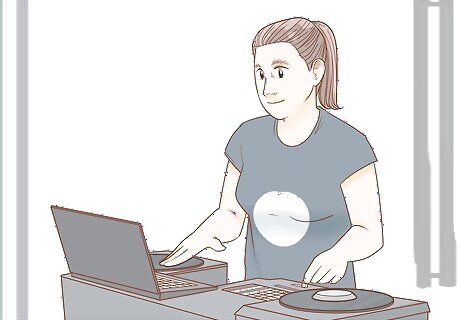
Play an electronic instrument. From digital DJs to synth wizards, the traditional definition of what it means to be a "musician" is much larger than it used to be. Just as much complex and artistic music can be made by pushing buttons on a laptop just as it can by operating the valves on the trumpet, and just as legitimately.
Developing as a Player
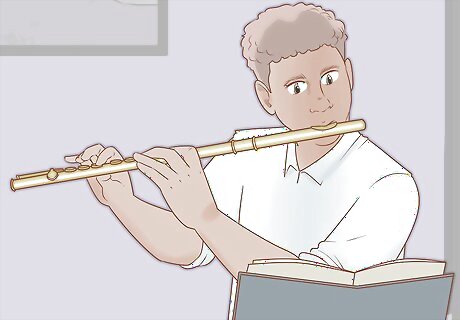
Practice constantly. Even if you have a natural talent for a certain instrument, there's a difference between "playing an instrument" and "being a musician." That difference involves practice. Musicians are dedicated to improve their skills and learn new techniques and more complicated music on the instrument they've chosen. The only way to do that is regular and serious practice. Develop good practice habits and routines for yourself. Always practice using good posture, warm up beforehand, and try practicing for at least 20-40 minutes each day. If you are really serious about music, you can aim to practice about 2-3 hours a day, but with work and school it would get a little bit challenging. Practice a mixture of techniques, skills, and fun activities. For every scale you learn, take the time to mess around learning the Star Wars theme or some other fun song. Like when you exercise your body, consistency is very important. Try to practice every day, so you can maintain the good habits that you're building and develop them. Do not rush! If you want to improve something, always take it slow. Playing every instrument is basically about muscle memory, so if you can play it slow, you can gradually work your way up to play it fast. One way to make a practice session count is to take the hardest part of the music and practice it slowly. Do not just play the notes. Think deeper about the music. You need to understand its structure, how different parts are connected, and why they are there. Always try something different. Every time take at least a few minutes out of your learning time and try to learn something new, even if you are not comfortable with it. Break out of your own box.
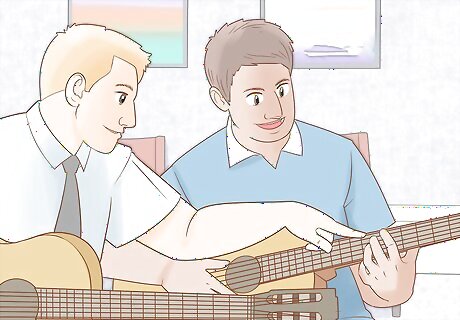
Find a good teacher. It's very difficult to learn music from a book alone. While written tutorials can be helpful, there's no substitute for in-person, one-on-one instructions that come from lessons with a good teacher. A teacher can help to correct your technique and build the fundamentals necessary to be a great player, whatever instrument you play. If you want to become a musician, it's very important that you be teachable. Hard-headed people who can't take criticism don't have much of a future as musicians. Listen closely to what good players say, follow directions, and learn everything you can. Make it your goal to get better. If you don't have the time or money to have a formal teacher-student relationship, find musicians who are better than you to play with. Evening jam sessions on the porch with a couple of guitars can be a great way to improve your skills. Watch and learn.
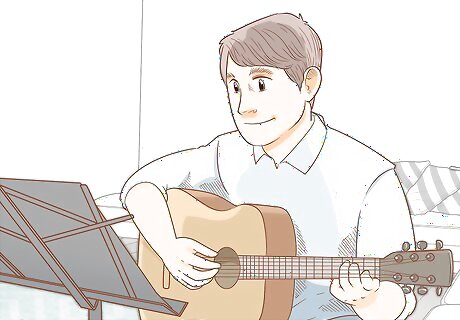
Consider learning to read music. While you can play by ear, it can be good if you can learn how to read sheet music, and is absolutely essential for certain instruments and styles. If you want to play classical music, it's almost impossible to learn by ear and rote memorization. Also, learn musical history and some theory if you hope to compose your own music one day. Learning why certain notes sound good together, how to make a chord, and how music actually works is the best way to improve as an instrumentalist and as a composer, whatever instrument you play.
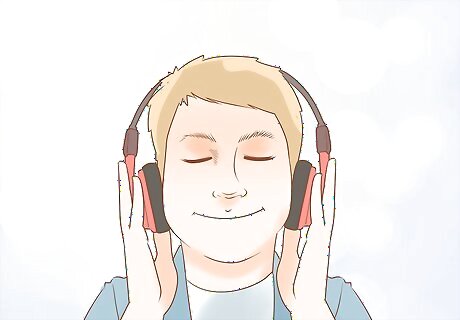
Listen to everything. Developing your own taste in music is critical for musicians. Just like a novelist has to read a wide variety of novels and learn about the history of literature to write something worth reading, a musician needs to listen to a wide variety of music and learn to appreciate different styles of music, if you ever want to write something worth hearing, or play music that deserves to be heard. Listen to classical music, starting with old court-based consort music and moving your way up through the romantic composers like Mozart and Beethoven. Try listening to the 20th century avant-garde composers like Penderecki and Cage to challenge your conceptions of what music is. Listen to rock music, of all strains, even if it's not your cup of tea. Check out early punk, rockabilly, and psychedelic nuggets. Listen to what's popular and what's not. Try to find something worth listening to and ignore the rest. When you find something you like, look back to the influences. If you like Katy Perry, you might find out that Cher and Madonna are huge influences on her style and sound. When you listen to Cher, you might work your way back to Etta James, and eventually work your way back to Bessie Smith, one of the greatest early blues singers of all time. Find the roots of your favorite artists.

Start writing your own compositions. To grow as a musician and to take your skills to the next level, it's a great idea to give composition a shot. Whether you play classically or play pop music, writing your own songs can help you see the difference between playing notes and making music much more quickly than almost anything else. Take the responsibility to write the notes you play.
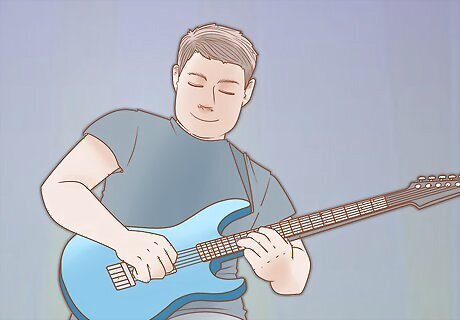
Find your own voice on your instrument. Miles Davis could never nail the horn technique of vibrato while learning to play his horn, so he built a whole career around a singular, sonorous, clean tone that never wavered. When asked why his band played so chuggingly, like a freight train, Johnny Cash responded, "We'd play faster if we could." Recast your supposed weaknesses as individual quirks and strengths and use them to become an individual player.
Taking the Next Step
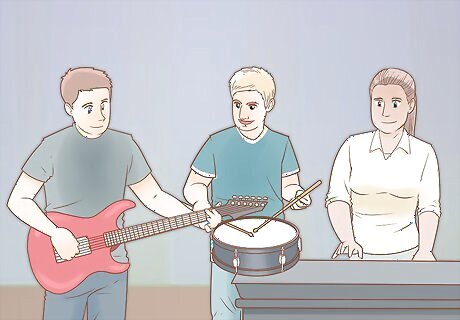
Consider joining an established band. Playing with other instrumentalists and musicians can give you the skills you need to improve, learning their specific tricks of the trade, as well as giving you the opportunity to respond to play as a unit, making music as one. If you want to play classical music or organized concert music, it's important to join a community band, a school band, or some other organized music group. Playing with others is also a good way to keep your ego in check. David Hood, part of the Muscle Shoals recording studio and one of the greatest session bass players of all time, was once asked how he got such a great reputation as as reliable player and he said, "My gear always worked and I was always on time." Humility serves musicians well.
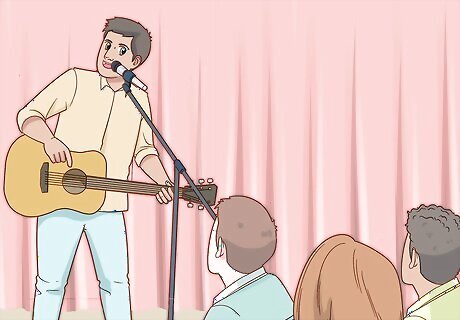
Play in front of people when you're ready. If you've been practicing your instrument on a regular basis and want to take it to the next level, it might be time to take your show public. Start by playing your best material in front of a few close and forgiving friends, or your parents, and start playing for other people. If you want to be a performer, you require an audience. Coffee shop open-mics are a great way to find a forgiving audience who'll be warm and accepting. Most open-mics are full of hobbyists who want to get started and most crowds are friendly and easy-going. It's a great way to crack in. Alternatively, just play for yourself. There's nowhere it says you have to ever play in front of anyone. Learn to play and enjoy the sounds you make for yourself.
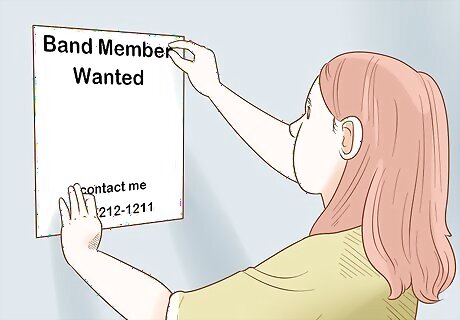
Try starting your own group. Having trouble finding an established group or band to play with? Start your own. Don't wait around for other musicians to come to you, go out and find them. Put an ad up on Craigslist with your biggest influences and your desire to play with a group that plays a particular kind of music and vet the other players who get in touch. Hang around the local music shops and put up ads for players. Go to open-mics and make contacts with other local musicians who can play.
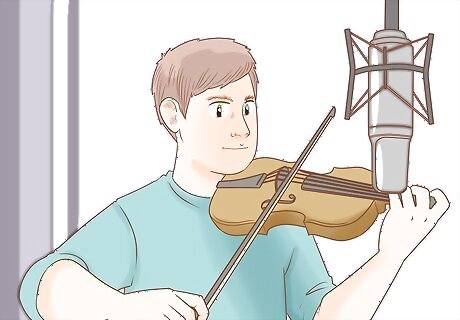
Record your music. Getting a recording of yourself playing can be one of the most rewarding and fun things for a young musician. Being able to actually hear yourself playing over the speakers? Nothing cooler. And these days, it's easier than ever to record yourself quickly and easily at home, and to have it sound great. Invest in a few cheap microphones to get started and record yourself directly to your computer using GarageBand or Audacity. Set the levels like you like them and burn CDs for your friends, or put them on your iPod. If you're feeling really ambitious, you can share your recordings with the world. Record your best stuff and start a Bandcamp page or a Soundcloud account to give out quick links to your tunes.
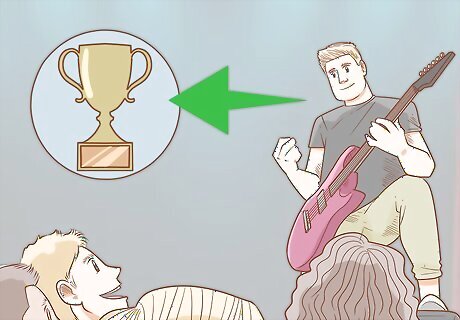
Commit to the long haul. Even if you're talented, even if you're a hard worker, even if you're the best banjo picker in your town, it's possible that you'll struggle to be heard. Being a musician can be a slog for a lot of people, and it can take a long time before the fruits of your labor start to pay off, both in terms of skill building and getting any kind of recognition, much less money. The more dedicated you are, however, the bigger chance you give yourself for success. Consider going to music school if you want to make contacts and receive individualized training on your instrument. Even if you don't want to play classical, learning the skills of music production and history can give you an edge in the music business. Taylor Swift Taylor Swift, Singer & Businesswoman Grow your career by continuously setting goals. "As soon as I accomplish one goal, I replace it with another one. I try not to get too far ahead of myself. I just say to myself, 'All right, well, I'd like to headline a tour,' and then when I get there, we'll see what my next goal is."











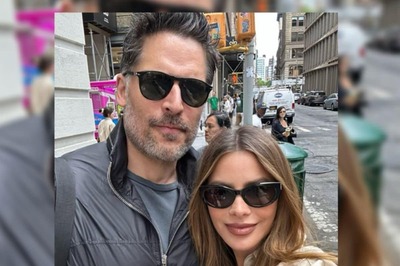


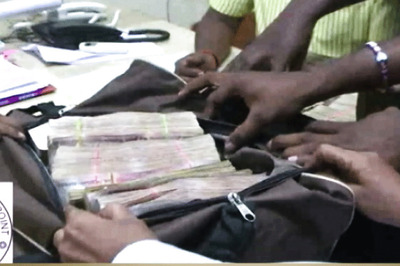


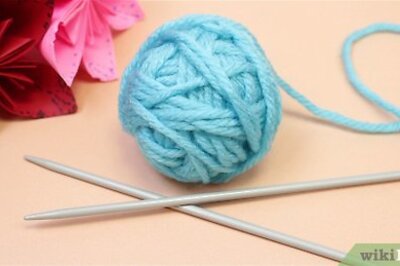

Comments
0 comment